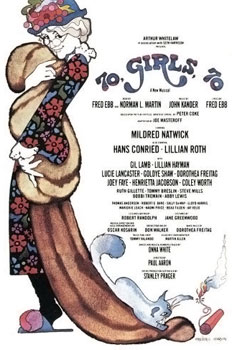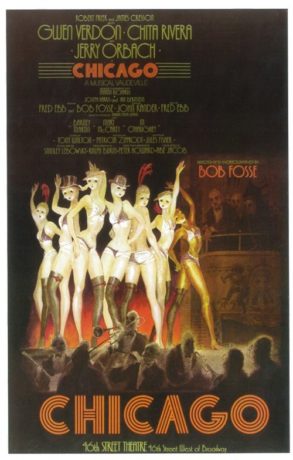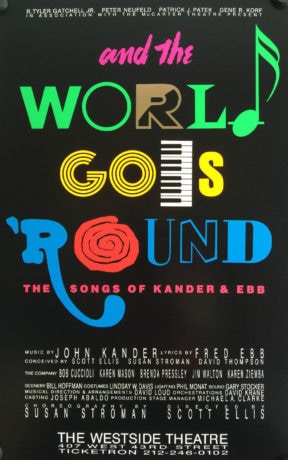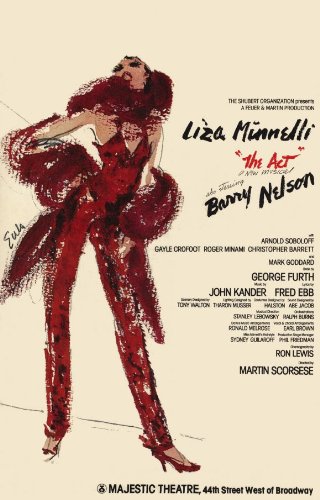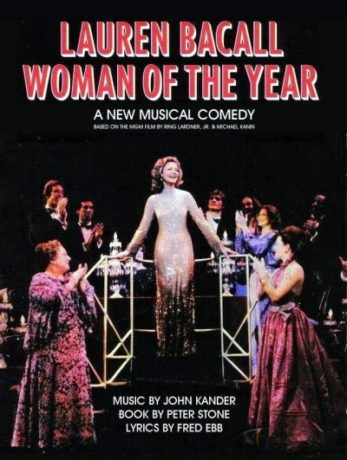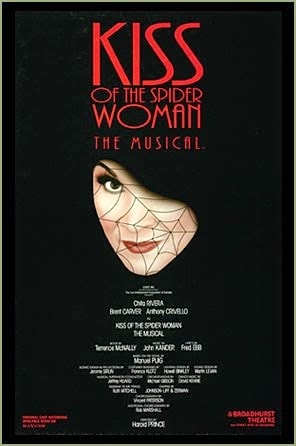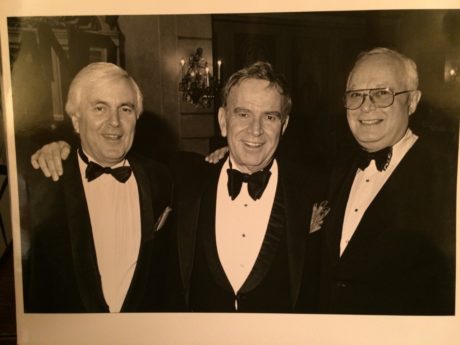
ACT TWO.
Two years later, in 1970, I once again tried to put together a package of my clients – in the show that became 70 Girls 70 – for I’d enjoyed looking after Chita Rivera, Ron Field, Kander and Ebb, other writers, and even an actor or two in Cabaret and Zorba!. For some months in that year I had a very happy experience wearing another hat, by working on Broadway with a young client, Paul Aaron, who directed Paris is Out!, a family comedy that I wrote. It had a decent but unspectacular run on Broadway (104 performances), then a tour with another star. Paul had begun his career by staging a musical (Salvation) which ran off-Broadway for 239 performances. It was a good show by new people, but I’d found he was very able to communicate with veterans as well, and my play dealt with a New York Mom and Pop in their sixties. So when Fred and John decided they wanted to write a musical about older folks, we turned to Paul to direct and to Arthur Whitelaw (You’re A Good Man, Charlie Brown) to produce.
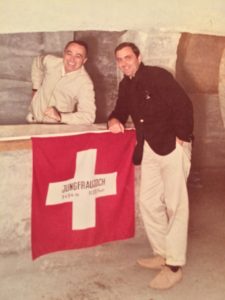
Arthur had been not so patiently waiting to produce a musical by John and Fred for almost three years, and they were now ready to sign on with him. They chose as source material a British play called Breath of Spring and they turned to their old collaborator Joe Masteroff to adapt it. Paul Aaron had done a fine job directing Molly Picon, Sam Levene and Dorothy Sands in my play and those three leading actors had combined ages well over 200, so all agreed Paul would be a good choice to handle a company of septuagenarians (except for one youth). Arthur and his staff tried to cast entirely with actors of that vintage but it wasn’t easy.
I remember an offer to Gertrude Niesen, then in retirement thirty years after her great success in the wartime musical Follow the Girls. Her silky, sexy voice and brassy comic style would have worked well now that she was old enough to play the leader of a gang of retirees who become fur thieves in order to support the fading hotel in which they were all happily living. Ms. Niesen’s response to the offer was: “Play an old lady?! I should say not!”
And so it went until the very popular Mildred Natwick (Candida, Blithe Spirit, Barefoot In The Park) decided it would be fun to do a musical, though her singing voice belonged more in a church choir than at center stage on Broadway. Hopes were high that it would be considered a refreshing change of pace for their star and for my two writers; a light-hearted romp which would add another feather to John (and Fred’s) caps. A life in the theatre, always exciting and always a challenge, proved both applied, as Paul Aaron made many friends but just couldn’t help shepherd the material into shape, and Stanley Prager was brought in to ‘supervise’ his direction. It’s a funny thing about musicals.
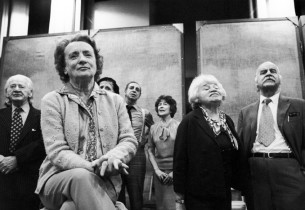
For all the Rex Harrisons or Richard Burtons who score a success in a musical even though they are not technically “singers”, we have a Robert Ryan (Mr. President) , Eileen Heckart (A Family Affair), Bette Davis (Two’s Company) Liv Ullman ( I Remember Mama), or Shelley Winters (Minnie’s Boys) all of whom have earned top honors as dramatic stars who came a cropper when heading up a big musical.
Ms. Natwick was hardly the reason for the failure of what became 70 Girls 70, but she couldn’t elevate its light story and score into a box office hit. Bad luck didn’t help some wonderful performers like Hans Conried, Lillian Roth and particularly David Burns. Burns paid the ultimate price. He literally died on stage after completing his final number, and thoughtfully moved upstage before expiring, where he fell and remained through the curtain calls. An actor’s dream of a final exit, but still… it didn’t augur well for the run of the show. And David Burns was such a wonderful actor and gentleman. It was a great loss for the Broadway theatre community.
The opening at the Broadhurst Theatre on April 15, 1971 preceded the closing by just a month when 70 Girls 70 folded unceremoniously after 35 performances. A different cast then had a brief shot at resuscitating it during a summer run in London in 1991 but the show has never found the reception John and Fred, Joe Masteroff, Arthur Whitelaw and certainly Paul Aaron hoped for it. They all did have a breath of spring, but just a short one I’m afraid.
That was 1971. Four long years followed with no theatre project to put them back on Broadway where they belonged, to return them to the inner circle of writers with giant hits running on the main stem. The years were long but hardly lean, as they turned to other fields which warmly welcomed them. John had a go at composing for the screen and turned out the background scores for nine films over the next years, starting with An Early Frost in 1970.
But a big show was looming and it seemed to take forever to ready itself. It was Chicago, based on a play of that name by Maureen Watkins, which was a property that Bob Fosse and his then wife Gwen Verdon had been excited about adapting into a musical. Ms. Watkins, whose life had become a lot less wild since her play appeared in 1926, had no interest in having her torrid story of the life and times of Roxie Hart brought back into the public conscience. No, these musical theatre icons had to cool their talented heels and wait until Ms. Watkins passed on in 1969 and then finally her executors, acknowledging that Mr. and Mrs. Fosse (they were married) might greatly enhance the value of Ms. Watkins’ work, okayed the project.
So producers Robert Fryer and Martin Richards started negotiating with me for Kander and Ebb to write a musical for Ms. Verdon, with Fosse and Ebb collaborating on the book that would then support the Kander and Ebb score. I remember doing all my negotiating with Mr. Richards, who called me from a Manhattan hotel room, where he was hiding from the ex-husband of the woman he was courting. “I can’t tell you where I am” was his opening remark, “and you can’t call me; I’ll always have to call you, because I have to be very careful.” I seem to recall the poor man didn’t get sprung for quite a while, for though we agreed on the basic terms of the agreement, there were fine points that took weeks to resolve.
I’m happy to report that his lady and he did marry eventually, formed their own production company and remained happily tied until she died in 1990.
Just as Chicago was about to go into rehearsal in the spring of 1974, Bob Fosse suffered a heart attack, and though cancellation of the show was possible, he recovered sufficiently for a postponement to be announced. The show was delayed for a year! The cast vowed to keep itself available, and the management did what it could to get them employment elsewhere.
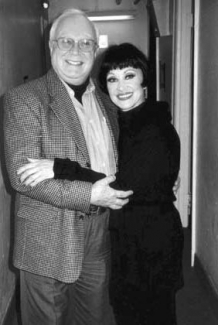
I had a personal career highlight when it was decided that Fred and John would write an act for Chita Rivera who was to co-star in Chicago. She had never had a cabaret act and they decided, with the help of choreographer Ron Field, to create one for her. That meant that I represented — everybody! They even allowed Rivera to introduce what would become her signature song, “All That Jazz”, in the act. Without any help from me (cabaret bookings were not my scene) they managed to find an opening at the Grande Finale, an “in” club on New York’s upper west side, and the act became the talk of the town. Interest in Chicago grew keener, and Rivera found a second career playing clubs whenever in future she found herself at liberty. She performs versions of this act to this day.
Along the way, during that final year, I decided I’d gone as far as I could with my list of personal clients. I discovered that what I had found the most rewarding in my twenty years away from acting was the kick I got from spotting talented youngsters, representing them, and doing my best to keep them with me until they became totally established. John and Fred, and the others, were now big time, and that meant that most of my dealings on their behalves involved lawyers, accountants, tax advisors, other agents, and sometimes pain in the neck husbands, wives, and boyfriends who had the power of the pillow.
I was still an ex-actor, a produced playwright, and I realized that win, lose or draw I wanted to spend the rest of my working life in the pungent middle of the fray, not on the sidelines helping young things to grow. Even my agency career had gone through enormous change. The success of Cabaret for John and Fred, the rise of Ron Field as a 3-time Tony Winner, the emergence of Chita Rivera as a multi-talented musical artist who needed international representation, had all contributed to my desire to try to return to the stage myself, to continue to write and to join my clients in that scary world, because those dazzling creatures had given me the courage to let that other me out of hiding.
So in 1974 I requested an out from my contract with CMA, where I’d been employed for four of the five years I’d signed on for when they bought the small agency where I’d spent seven happy years with two very dear partners, Leo Bookman and Stark Hesseltine. Together we’d created a business that was attractive to the moguls at CMA and in 1969 we sold our small agency to them. We all signed five year employment contracts, but I was restless, so I arranged with Sam Cohn, one of their head honchos, to be released after four years. Grateful that he gave me the out, I agreed to see through to production any deals I had already negotiated — but I’d be allowed to spend that final year working at home so I could begin to open other doors.
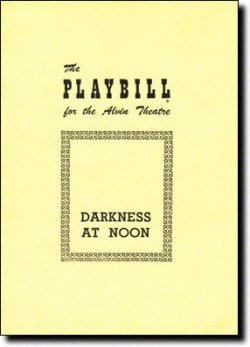
Chicago played over 900 performances in its first outing on Broadway, and is currently in the 22nd year of its latest revival! It’s the longest running revival in history, and it alone would put John (and Fred of course) in the pantheon with the immortals. But Chicago is hardly the end of John’s story. In the nearly 40 years since I turned over their representation to others, he and Fred have brought six major musicals to the stage, plus three that were not quite complete when Fred died in 2004. John finished them all, injecting his own lyrics where necessary, and all three have now had outings of varying success in New York. All of them are worthy, and they will always be there to remind us how enriched we who’ve been exposed have become.
I was connected to these post-agency musicals only as an ardent member of their audiences. I saw The Visit in each of its three pre-Broadway productions, and marveled at the power of all of them. That third Kander and Ebb project for Chita Rivera, The Visit was another gift after the memorable work she did with them in Chicago and Kiss of the Spider Woman.
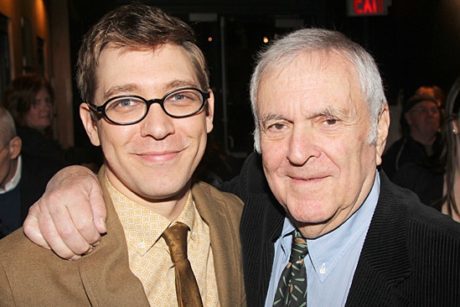
John’s new collaboration with Greg Pierce, Kid Victory, is astonishing as well. Fifty years apart in age, they work harmoniously – and with two musicals produced already, we have good reason to think there will be more to come. As I say, I always go to one of John’s musicals now with the feeling I’m about to share something with someone from my past whose work continues to connect me to him. I will always remember the feeling I had when I first heard him play some of The Enchanted in a borrowed apartment sixty years ago!
ACT THREE.
I’ll leave you now with a list and some very brief comments on the many projects for the theatre that John has composed since 1975.
There were two revues using material from the Ebb and Kander catalogue.
Seth Glassman directed one called “2×5” at the Village Gate in 1976, and a second revue called And The World Goes Round introduced them to Scott Ellis and Susan Strohman who have become important members of what John correctly calls his family.
The Act was a money-making disappointment that reunited them with Liza Minnelli in a show that was more a club act than a musical play.
Three years later they had Lauren Bacall back on Broadway in Woman Of The Year in which the film star had a good time until she didn’t any more.
Raquel Welch replaced her, and surprised the tough pre-opening nay sayers by delivering a swell performance. Debbie Reynolds played the role as well, and this musical, which hasn’t had much of a life since, played for two years and gave over 700 performances.
For most writers, that would indicate a smash hit. For John and Fred, it was considered by some to be a minor work.
That’s what happens when you set a mile high standard for yourself. And even Michelangelo missed once in a while.
Three years later, in 1981 they turned out a labor of love, this time with both of their particular favorites, Chita Rivera and Liza Minnelli. Chita admits she was, to put it mildly, surprised when she learned she was to play Liza’s mother in The Rink, for they were pals offstage and she felt more like her sister than her mother, but she’d forgotten the 13-year disparity in their ages, and once she adjusted to that, they made a lovely combo.
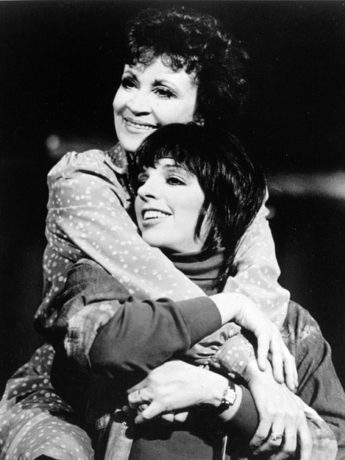
The show did not ring a bell with the larger public, and Liza’s frequent absences didn’t help the box office, The Rink had to close its doors after 204 performances. It was one of those happy collaborations with Terrence McNally the book writer with whom they would later work again and again. Scott Ellis and Rob Marshall were both in the ensemble, and both would figure prominently in their future as directors and choreographers.
One of my own happy memories of The Rink came one day when between her matinée and evening shows, Chita and I had dinner together because I was appearing in End of the World, playing at the Music Box down the street from her theatre, the Hirschfeld. A small fantasy of mine, realized — a great star and her ex-agent, both appearing on Broadway at the same time. A first!
John and Fred didn’t write another new show until Kiss of the Spider Woman finally burst forth (again with Terrence McNally on book and Hal Prince as director) in 1992 after a nearly life threatening (to the show, not to them) tryout in Purchase, New York where a Frank Rich early review in the New York Times almost put a bullet through its heart.
But those four pros don’t quit just because a critic doesn’t get what they’re up to, and after a complete rewrite and a new Spider Woman (the great Chita Rivera again) everybody was back on top – again.
FINALE. ‘TO BE CONTINUED’.
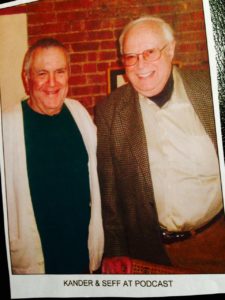
The rest is all in the record books. But my involvement with what followed for John professionally includes me only as a fan; in my great joy in sitting in the audience at Curtains, The Scottsboro Boys, The Visit, and John’s ongoing works with his new collaborator, Greg Pierce. In the years between 2004 when Fred Ebb died, and 2015 when The Visit arrived in New York after three regional productions during which it was finally shaped, John Kander worked harder than ever to make certain that these musicals, not quite completed when Ebb passed away, found homes on Broadway.
The three shows are all very different — Curtains for showing us how light heartedly and tenderly they could write, Scarborough Boys for its daring to deal with a dark chapter in America’s history in a most imaginative way, and The Visit for giving Chita Rivera a chance to dazzle us once again in a powerful story of love and revenge.
Happily, there is no end to the story of the boy from Kansas City who came to the big city to make his mark. Yes, he’s had some luck along the way, (he often offers samplings of it during the many interviews that his celebrity creates). But he is also so responsible for much of that luck by his constant devotion and commitment to the tasks at hand, and in his loyalty to friends and colleagues.
I’ve never heard anyone describe John Kander as less than generous and gracious. I’m so delighted that he is working with Greg Pierce on several new projects, and that one of them is a musicalization of The Enchanted, the Giradoux and Valency play that brought him into my life over sixty years ago. The rights he sought then have undoubtedly been granted to him and if true, that’s one wrong that has finally been set right.
Happy 90th Birthday, dear John Harold Kander.
LINKS:
‘Come Hear The Music Play’-A Behind-The-Scenes Look at Kander and Ebb’s Musicals by Their Former Agent Richard Seff Begins Tomorrow on DCMetroTheaterArts by Richard Seff.
‘COME HEAR THE MUSIC PLAY:’ Memories of My Twenty Years as Agent For John Kander by Richard Seff: Part One: The House Lights Dim’ By Richard Seff.
‘COME HEAR THE MUSIC PLAY:’ Memories of My Twenty Years as Agent For John Kander by Richard Seff: Part Two: ‘The Curtain Rises’: ‘Flora, The Red Menace, ‘Cabaret, ‘Zorba,’ and ‘The Happy Time.’
‘COME HEAR THE MUSIC PLAY:’ Part 3: Memories of My Twenty Years as Agent For John Kander by Richard Seff: Part Three: ’70 Girls 70,’ ‘Chicago,’ ‘The Rink,” ‘The World Goes Round,’ ‘The Act’, ‘Woman of the Year’, and ‘Kiss of the Spider Woman’
Richard Seff’s memoirs: Supporting Player: My Life Upon the Wicked Stage.


